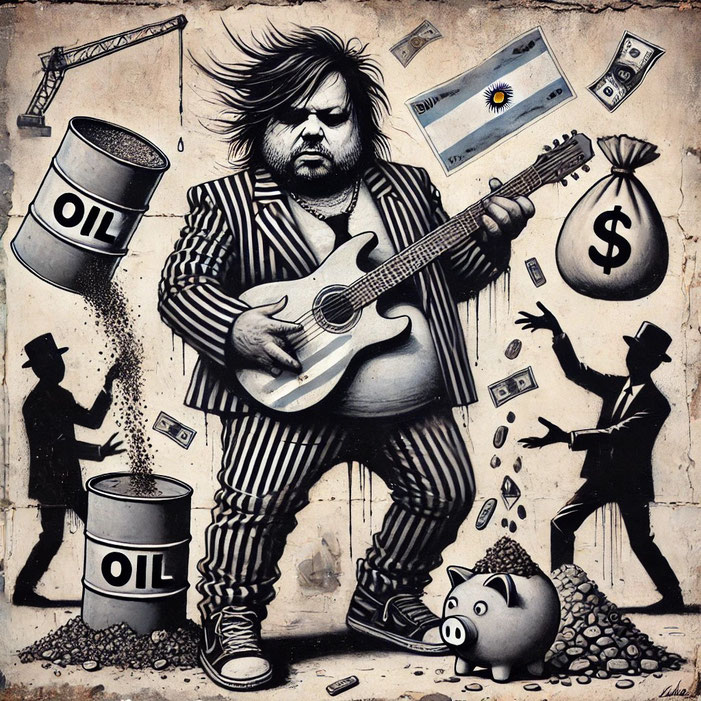
Utter Failure: Javier Milei's First Year Assessment
A Year of Broken Promises, Money Printing and Economic Indebtedness.
4-5 minute read
TL;DR
Javier Milei’s first year as Argentina’s president has been a catastrophic betrayal of libertarian ideals. His administration has overseen skyrocketing money supply, ballooning public debt, and failed promises to abolish the central bank. Dollarization threatens Argentina’s sovereignty, privatization enriches the elite, and inflation continues unchecked. Instead of liberating the nation, Milei’s policies serve international finance, leaving Argentina more unequal, indebted, and unstable than ever.

Javier Milei's First Year Assessment: Utter Failure
Argentina’s fake 'libertarian' experiment under Javier Milei has devolved into a cautionary tale of betrayal, broken promises, and economic catastrophe. For a man who rose to power with fiery rhetoric about dismantling the state and abolishing the central bank, Milei’s first year in office has been marked by policies that not only contradict his libertarian ideals but also exacerbate the very crises he vowed to resolve. What promised to be a free-market revolution has turned into a textbook case of populist inflationism, leaving Argentina more indebted, unequal, and unstable than ever.
Skyrocketing Money Supply and Crushing Debt
Milei’s presidency has overseen an unprecedented expansion of the money supply. Argentina’s monetary aggregates have surged at rates that dwarf even the most irresponsible actions of previous administrations: M0 increased by 209%, M1 by 133%, and M3 by 123%. To put this in perspective, the highest annual growth rate in the last four years for M2 was 90%, a figure Milei’s policies have obliterated. Such reckless monetary expansion has deepened Argentina’s inflationary spiral, driving the peso into a nosedive and eroding the purchasing power of ordinary Argentinians.
Meanwhile, public debt has ballooned. In just six months, Argentina’s national debt grew from $370 billion to $442 billion—a staggering 19.4% increase. This $72 billion borrowing spree, much of it sourced from the IMF and international banks, flies in the face of Milei’s libertarian rhetoric. Rather than liberating Argentina from the clutches of debt slavery, he has mortgaged the nation’s future to foreign creditors, further entrenching its dependency on global financial institutions.
The Death of Libertarian Promises
Central to Milei’s campaign was the abolition of the central bank, a cornerstone of his so-called libertarian manifesto. Yet, instead of shutting it down, he has allowed the institution to continue its destructive cycle of printing money. Taxes, another target of his anti-state crusade, have not been slashed but raised to fund the mounting debt. These betrayals have left Milei’s supporters disillusioned and his critics vindicated.
The justification for abandoning his promises? The well-worn statist excuse that such measures would be “politically unfeasible.” This rationale mirrors the same Keynesian technocratic logic Milei once decried, revealing the hollowness of his commitment to Austrian economics. By maintaining the central bank and increasing fiscal burdens, Milei has proven to be less a libertarian revolutionary and more a populist opportunist.
Dollarization and Privatization: Myths and Misery
Milei’s flagship policy of dollarization—replacing the peso with the US dollar—has been touted as a panacea for Argentina’s inflation woes. While superficially appealing in a country plagued by currency devaluation, dollarization comes with a steep cost: the surrender of monetary sovereignty to the U.S. Federal Reserve. This would render Argentina an economic vassal state, its fiscal policies dictated by Washington rather than by the needs of its own people.
Similarly, Milei’s aggressive privatization agenda threatens to replicate the disastrous policies of the 1990s. By selling off state-owned enterprises and public utilities, he risks enriching a select few at the expense of the many. History shows that such fire sales lead to skyrocketing costs for essential services like water and electricity, further impoverishing working-class Argentinians.
The IMF’s Long Shadow
Perhaps Milei’s most egregious betrayal lies in his dealings with the IMF. Despite his anti-establishment posturing, he has followed in the footsteps of previous administrations by seeking bailouts from the very institutions he once denounced. These loans come with austerity measures that disproportionately impact the most vulnerable sectors of society, perpetuating a cycle of economic hardship and social unrest.
Even Argentina’s gold reserves have not been spared. In a desperate bid for liquidity, Milei shipped the nation’s remaining gold reserves to London, mirroring the catastrophic policies of Juan Domingo Perón. Once a symbol of Argentina’s financial sovereignty, these reserves now stand at a pitiful 61 tons, a figure Milei seems determined to drive to zero.
The Ghost of Pinochet’s Chile
Milei’s administration bears striking similarities to the neoliberal experiment of Augusto Pinochet’s Chile. Like Milei, Pinochet promised economic salvation through radical market reforms. And like Pinochet, his policies delivered short-term stability at the cost of long-term misery. Inflation may have dropped, but inequality soared, public services deteriorated, and social unrest became endemic.
Milei’s disdain for unions and organized labor further underscores these parallels. His administration has targeted labor protections in the name of “flexibility,” a euphemism for lower wages and longer hours. By weakening unions, Milei paves the way for a race to the bottom, where workers bear the brunt of economic mismanagement.

Inflation and the Illusion of Stability
Despite his anti-socialist rhetoric, Milei has embraced the same inflationary populism that defined his predecessors. His government continues to prop up unsustainable policies through debt and monetary expansion, with disastrous consequences for the Argentine peso and the broader economy. Meanwhile, wages remain stagnant, and the cost of living soars, leaving workers to shoulder the burden of Milei’s failures.
The Bitter Lessons of Populism
Javier Milei’s first year in office is a stark reminder of the dangers of populism masquerading as libertarianism. His theatrical antics and anti-establishment rhetoric have masked a deeper truth: his administration serves the interests of international finance, not the Argentine people. Dollarization benefits Wall Street, privatization enriches multinational corporations, and a weakened labor movement empowers the oligarchs.
The parallels with Pinochet’s Chile and Argentina’s own history of neoliberal disasters are clear. Milei’s policies will not solve Argentina’s structural economic problems; they will exacerbate them. In doing so, he has condemned the nation to more debt, more inequality, and more suffering.
Dismal Disappointment
Javier Milei’s presidency has been an utter failure, marked by broken promises and economic mismanagement. His administration has prioritized short-term gains over structural reform, mortgaging Argentina’s future to foreign creditors and deepening its economic woes. For a man who claimed to champion liberty and free markets, Milei has proven to be anything but. Instead, his first year in office is a cautionary tale of libertarian ideals co-opted by populist opportunism, leaving Argentina more divided and despairing than ever.
#Snarchy #Anarcos #Argentina #DebtCrisis #Milei #AustrianEconomics
Glossary
- Inflation (/ɪnˈfleɪʃən/): The general increase in prices and fall in the purchasing power of money.
- Central Bank (/sɛntrəl bæŋk/): A national institution responsible for monetary policy and currency issuance.
- Austrian Economics (/u02c8ɔːstriən iˈkɒnəmɪks/): A school of economic thought emphasizing free markets and limited government intervention.
- Default (/dɪˈfɔːlt/): Failure to repay a debt.
- Public Debt (/pʌblɪk dɛt/): Money owed by a government to creditors.
- Monetary Policy (/mɒnɪtɛri pɒlɪsi/): The process by which a central bank manages a nation’s currency and interest rates.
- IMF (/aɪ ɛm ɛf/): International Monetary Fund, an organization that provides financial assistance to countries.
- Populism (/pɒpjʊlɪzəm/): Political approach appealing to ordinary people who feel disenfranchised.


Write a comment